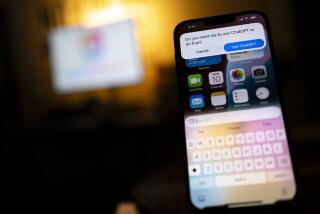Administration to Oppose Home Digital Disc Taping
- Share via
WASHINGTON — The Reagan Administration will propose legislation to prevent home taping of compact discs and other recorded material by new digital audio tape recorders that are expected to be marketed later this year, officials said Friday.
The measure, which will be included in the Administration’s trade and “competitiveness” package that will be submitted to Congress later this month, would not apply to existing cassette tape recorders or videotape recorders, which are widely used to tape prerecorded material.
Under the proposal, digital tape recorders--which promise to offer the clear sound of laser-read compact disks without the background noise and tape hiss inherent in analog recordings--could not be imported or manufactured in the United States unless they contained a computer chip that would block automatically the recording of certain copyright-protected material.
However, industry officials said, if lawmakers go along with the proposal, the recording industry is likely to mount a further lobbying effort to require that other taping devices include a similar electronic device that would block the recording of future copyright-protected material on records, compact discs, prerecorded cassettes and videotapes.
The proposal, the Administration’s first venture into the heated controversy over home taping, pits the Japanese manufacturers of consumer electronic machines against the recording industry, which has been seeking government help for several years to protect its copyrights against private recording.
Digital audio tape--or DAT--recorders, which were recently demonstrated at an industry trade show in Las Vegas, have not yet been offered to consumers. But record industry officials are worried that digital technology, which breaks down sound waves into millions of numbers encoded on discs or tapes, would allow individuals to produce their own tapes that would be nearly indistinguishable from the sound recorded on compact disks.
Wilson Introduces Bill
Sen. Pete Wilson (R-Calif.), along with four other lawmakers, introduced a bill similar to the Administration’s proposal earlier this week. His measure would require digital audio tape recorders to include the computer chip, known as a “copy code scanner,” which would recognize an inaudible signal that can be encoded on compact discs and other audio sources at the time of manufacture.
“When one recognizes that the music being copied is primarily American-produced, while the machines and tapes are made in Japan,” Wilson said, “the introduction of DAT machines into the U.S. market can be seen as yet another unfair Japanese commercial practice.”
The Administration has expressed support in the past for the recording industry’s effort to prevent home taping by digital audio tape recorders. In background material prepared last month for President Reagan’s State of the Union address, there was a brief mention of the White House intention to offer legislation on the matter.
But Friday’s briefing by Administration officials, who talked with reporters on the condition that they not be identified or quoted directly, was the first detailed explanation of the proposal.
Manufacturers Express Outrage
Representatives of electronic manufacturers immediately expressed outrage at the White House position.
“This will kill DAT in the cradle,” said Alan Schlosser, a senior official at the Electronic Industries Assn. here. “I can’t believe they are going to insist on this blatantly anti-technology position.”
But a record industry spokesman defended the proposal as necessary to prevent the industry and recording artists from being harmed by the uncontrolled duplication of their “intellectual property.”
“The problem of home taping already costs the recording industry at least $1.5 billion,” argued Trish Heimers of the Recording Industry Assn. of America. “We’re concerned about a fresh incentive for people to tape at home, and this is a very reasonable solution to the problem.”
Supreme Court Ruling
In a related matter, the Supreme Court ruled three years ago that home videotape recording for personal use did not violate U.S. copyright laws, but it left open the possibility that Congress could impose a royalty tax on blank tape or place limits on home taping by requiring that machines include electronic anti-taping devices.
Heimers acknowledged that the industry would also like to see the anti-taping devices included in other recording machines if Congress is willing to go along with the proposal affecting digital audio tape recorders.
The devices would only prevent taping of future recordings manufactured with the hidden signal, but re-issues of old recordings could also be encoded to prevent taping by any machine equipped with the copy code scanner.
In an attempt to blunt the recording industry’s campaign to require scanners, Japanese manufacturers are preparing DAT machines so that they cannot record directly from one digital source to another. But many record industry officials believe that an effort to dilute the quality of the recordings still would not overcome their fears of copyright infringement by home tape recorders.
More to Read
The biggest entertainment stories
Get our big stories about Hollywood, film, television, music, arts, culture and more right in your inbox as soon as they publish.
You may occasionally receive promotional content from the Los Angeles Times.










